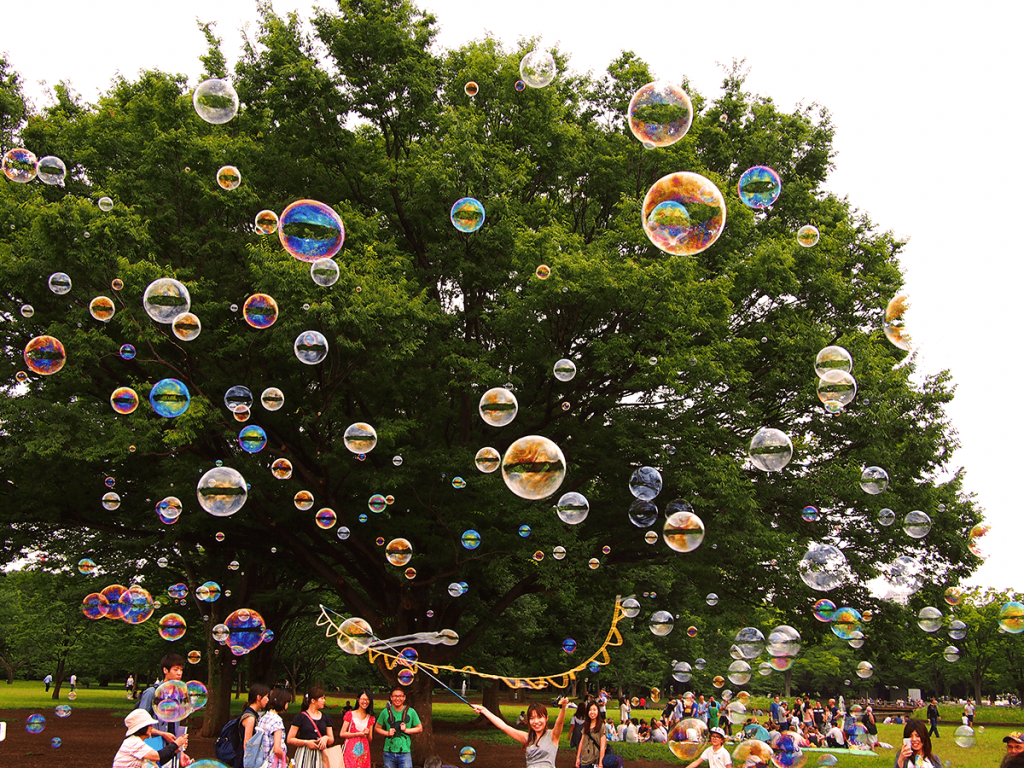Long before I became a father, and long before I became a regular resident of Tokyo, I had been fascinated by the mysteries and anxieties of kōen-debyuu, also known as the first time you take your toddler to the local playground (kōen usually refers to a park, but colloquially it doubles for playground, even if the playground is surrounded by concrete instead of greenery). Will you be accepted into the local mommy gang? Or will you fail the test, because you or your offspring are underdressed or overdressed, or you are not using the hip organic mosquito spray that EVERYBODY is using now?
When I take my daughter Hana to the park on weekdays, I’m naturally the only dad among moms. That takes pressure off me, since I have no chance of fitting in by design. Some mothers find me endearing, because I’m a father. Some find me scary, because I’m a foreigner. Lucky for me, I have my two-year-old icebreaker with me. Hana will chat up anyone without hesitation, showing off her bruises and ribbons, rattling off the names of her favorite Disney princesses, asking questions about every tiny detail in her environment.
My Japanese leaves some room for improvement, euphemistically speaking. After the moms and I have confirmed the names, ages, favorite activities and cuteness of our children, conversation gets tough for me. I take no pride in that. I have met foreigners who consider it a boast-worthy achievement that they get by in Japan without ever learning a single word of Japanese. Not I. I would like to fill my room for improvement with lots of … improvement. Everybody has an excuse why they don’t have time to study: mine is taking my daughter to the park and then writing about it. Of course, I am learning a lot of Japanese with her and even from her, mainly the names of bugs. I have yet to figure out how to work that into a conversation with an adult. Most regular customers at my local bar don’t share my daughter’s obsession with roly polies, and they are not impressed that I can sing a song about them in Japanese. Actually, they might be impressed, but I reached that mellow age where I simply don’t drink enough anymore to burst into song in public.
Things in the park are much easier on the weekends, when my Japanese wife, Hana’s mother, accompanies us. We are not averse to meeting other couples with kids, and we have found the perfect in: soap bubbles. Hana loves them, we buy them, then we forget them at home. “Sumimasen, can we use some of your soap bubbles?” has become the new “Hi there, can you spare a cigarette?”
These days, of course, it isn’t enough to just blow the bubbles out of a tiny plastic ring with your own breath. There is soap bubble paraphernalia in all shapes and sizes. There are handguns of different levels of sophistication to produce really big bubbles, or rapid fire a whole lot of them simultaneously. We own several items. On the rare occasion that we don’t forget them at home, we often find that we are overequipped with our automatic bubbles rifle and come across as show-offs. Or we discover that other parents have found some even more impressive device that makes us feel insufficient. These are the kōen-debyuu issues that no one ever talks about.
Seeing the shiny balls hovering over the kids and parents, I naturally begin to think of the semi-classic horror franchise Phantasm (who wouldn’t?). Those are the movies about a tall, grumpy old man (known as The Tall Man) from another world who sucks the lives out of earthlings with the help of deadly flying silver balls and an army of angry dwarves. It goes without saying that I don’t want any innocent lives sucked out of anyone in the park, so I see the children not as potential killer ball victims, but as my trusty dwarf army (I am obviously The Tall Man in this scenario, as I am in all other Japanese scenarios). Eventually my wife will say:
“You look happy. Are you thinking about silly old horror movies again?”
“Of course not. How could I, in this beautiful sunshine?” And blistering heat.
“Then what are you thinking about?”
“Life.”
And in a way, I am.









